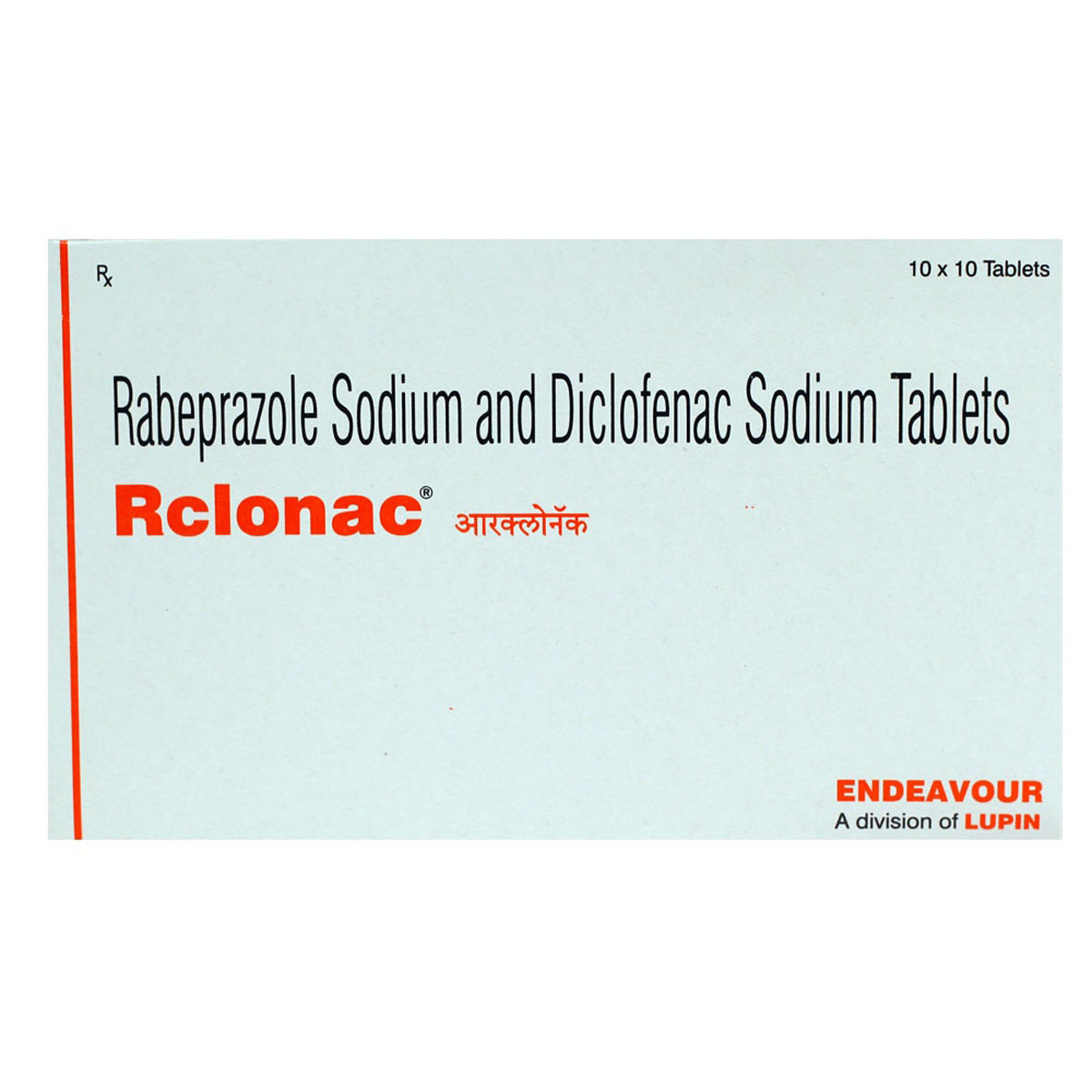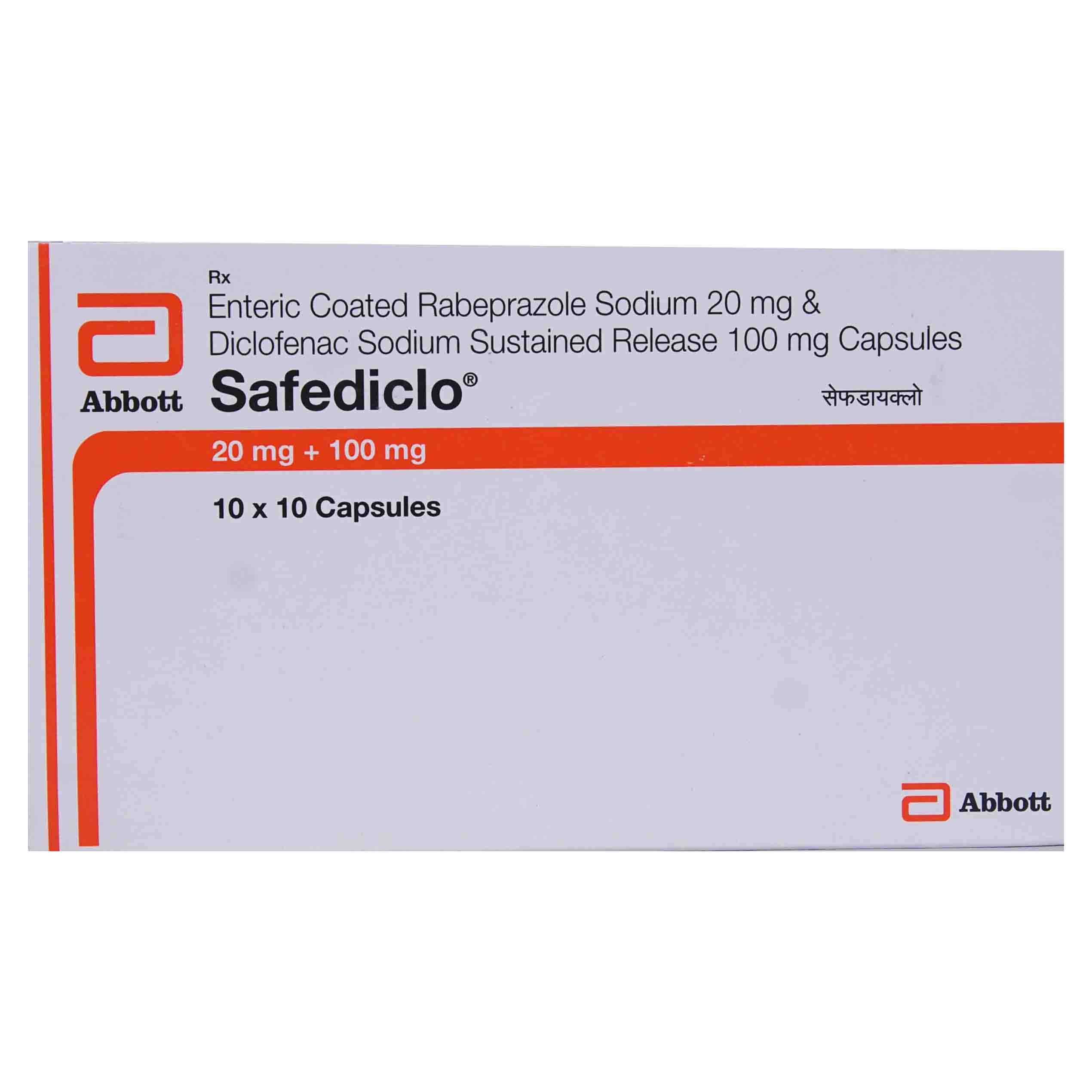Diclofenac+rabeprazole
About Diclofenac+rabeprazole
Diclofenac+rabeprazole belongs to the group of medicines called non-steroidal anti-inflammatory (NSAID). It is primarily taken to reduce pain and inflammation. Musculoskeletal pain refers to pain in the muscles, ligaments, bones, tendons, and nerves. This pain occurs in just one area of the body, like your back. You can also have it all over your body if you have a widespread situation like fibromyalgia (extreme muscle pain).
Diclofenac+rabeprazole is a combination of two drugs: Diclofenac (painkiller) and Rabeprazole (antacid). Diclofenac+rabeprazole contains diclofenac which works by blocking the chemical effect of an enzyme called cyclo-oxygenase (COX), which produces prostaglandins (mediators of pain and inflammation) which are responsible for the sense of pain and inflammation (redness and swelling). On the other hand, Rabeprazole is a proton-pump inhibitor that prevents damage to the stomach lining caused by Diclofenac.
Take Diclofenac+rabeprazole as prescribed by your doctor. You are advised to take Diclofenac+rabeprazole for as long as your doctor has prescribed it for you depending on your medical conditions. You may experience nausea, indigestion, flatulence, constipation, diarrhoea, and flu-like symptoms. Most of these side effects of Diclofenac+rabeprazole do not require medical attention and gradually resolve over time. However, if the side effects are persistent, reach out to your doctor.
If you are allergic to Diclofenac+rabeprazole or any other medicines, please tell your doctor. To treat your condition effectually, continue taking Diclofenac+rabeprazole for as long as your doctor has prescribed. To avoid recurring symptoms, do not stop it midway. Diclofenac+rabeprazole causes drowsiness and dizziness, so drive with caution. Diclofenac+rabeprazole should not be given to children as safety and efficacy have not been established. Avoid consuming alcohol along with Diclofenac+rabeprazole as it could lead to increased drowsiness and dizziness. If you are pregnant or breastfeeding, it is advised to inform your doctor before using Diclofenac+rabeprazole.
Uses of Diclofenac+rabeprazole
Medicinal Benefits
Diclofenac+rabeprazole is used to treat aches and pains, along with problems of musculoskeletal and joint pain. It helps the conditions of acute migraine headache, muscle pain, dental pain, rheumatoid arthritis, osteoarthritis, or painful menses. Diclofenac+rabeprazole is a combination drug containing diclofenac and simethicone. Diclofenac+rabeprazole contains diclofenac which works by blocking the chemical effect of an enzyme called cyclo-oxygenase (COX) which produces prostaglandins (mediators of pain and inflammation) which are responsible for the sense of pain and inflammation (redness and swelling). On the other hand, Diclofenac+rabeprazole contains Rabeprazole which is a proton-pump inhibitor that prevents harm to the stomach lining caused by Diclofenac.
Directions for Use
Storage
Side Effects of Diclofenac+rabeprazole
- Nausea
- Indigestion
- Flatulence
- Diarrhoea
- Flu-like symptoms
- Constipation
Drug Warnings
Consumption of alcohol should be avoided during the treatment with Diclofenac+rabeprazole as it may lead to increased risk of liver damage. Patients with a stomach ulcer, gastric bleeding, severe heart failure, high blood pressure, and liver or kidney disease should not take Diclofenac+rabeprazole. If you have a severe allergy to painkillers and have conditions like asthma, rhinitis (irritation and inflammation inside the nose), angioedema (swelling under the skin), or skin rashes, immediately stop taking Diclofenac+rabeprazole. Diclofenac+rabeprazole contains Rabeprazole that may cause brittle bones, so the intake of Vitamin D and calcium can be given by your doctor while using Diclofenac+rabeprazole. Besides this, it should be avoided during the last trimester of pregnancy, unless the doctor has prescribed you. If you are pregnant or breastfeeding, then do not take Diclofenac+rabeprazole without contact with the doctor. Diclofenac+rabeprazole shouldn't be given to children.
Drug Interactions
Drug-Drug Interactions: Diclofenac+rabeprazole interact with other painkillers (ketorolac, celecoxib, aspirin, ibuprofen, acetaminophen), blood thinners (Apixaban, clopidogrel, warfarin), anticancer medicines (methotrexate, busulfan), medicines for mania (lithium) antihypertensive (ramipril, aliskiren).
Drug-Food Interactions: Avoid consumption of alcohol while taking Diclofenac+rabeprazole as it might cause increased drowsiness and dizziness.
Drug-Disease Interactions: People with peptic ulcers, gastric bleeding, severe heart failure, diarrhoea, rashes, and high blood pressure should avoid intake of Diclofenac+rabeprazole as it may lead to life-threatening conditions.
Drug-Drug Interactions Checker List:
Safety Advice

Alcohol
cautionYou are recommended to avoid alcohol consumption while taking Diclofenac+rabeprazole. Alcohol intake, along with Diclofenac+rabeprazole, may cause increased drowsiness and drowsiness. It may also increase the risk of stomach bleeding. Please consult your doctor if you have any concerns regarding this.

Pregnancy
cautionPlease consult your doctor before taking Diclofenac+rabeprazole if you are pregnant or planning to conceive

Breast Feeding
cautionPlease consult your doctor before taking Diclofenac+rabeprazole if you are breastfeeding.

Driving
cautionDiclofenac+rabeprazole may cause drowsiness, dizziness, or abnormal vision. Do not drive or operate heavy machinery if you feel dizzy or drowsy.

Liver
cautionIf u have or had a history or evidence of any liver-related diseases, please consult the doctor before taking the Diclofenac+rabeprazole.

Kidney
cautionIf you have had a history of any kidney-related diseases, please consult the doctor before taking the Diclofenac+rabeprazole.

Children
unsafeDiclofenac+rabeprazole should not be given to children below 12 years as the safety and effectiveness were not established.
Habit Forming
Diet & Lifestyle Advise
- Include more glucosamine, chondroitin sulphate, vitamin D, calcium-enriched supplements. Besides this, turmeric and fish oils can help in reducing inflammation in the tissue.
- Please do not go for heavy exercise as it may increase your joint pain in arthritis. Instead, you can do stretching, low impact aerobic exercise like walking on a treadmill, bike riding, and swimming. You can also strengthen your muscle strength by lifting light weights.
- In the chronic conditions of arthritis or joint pain, try to include fish like salmon, trout, tuna, and sardines. These fishes are enriched with omega-3 fatty acids that minimize the level of chemicals called cytokines, which ramp up inflammation.
- Your sitting posture is important, especially when have pain and inflammation condition. Try to sit little as possible, and only for a short time (10-15 min). Use back support like a rolled-up towel at the back of your curve to minimize pain. Keep your knees and hips at a right angle. Besides this, you can use a footrest if required.
Special Advise
- Diclofenac+rabeprazole tends to cause stomach upset. Thus, it is recommended to consume Diclofenac+rabeprazole with meals to minimize gastric side effects. If you have a peptic ulcer diagnosis, Diclofenac+rabeprazole is best avoided unless prescribed by your doctor.
- Diclofenac+rabeprazole can cause liver injury when taken in large doses. Concomitant use of alcohol is best avoided as it aggravates liver toxicity.
- Diclofenac+rabeprazole contains Rabeprazole which may cause kidney problems in rare cases, so if you are urinating less than usual, or have blood coming in your urine, let your doctor know about this.
Patients Concern
Disease/Condition Glossary
Musculoskeletal pain refers to pain in the muscles, ligaments, bones, tendons, and nerves. This pain occurs in just one area of the body, like your back. You can also have it all over your body if you have a widespread situation like fibromyalgia (extreme muscle pain). The pain can vary from mild to severe sufficient to affect your day-to-day life. It may start unexpectedly and be short-lived, which is known as acute pain. Pain that lasts for more than 3 to 6 months is known as chronic pain.
Rheumatoid arthritis is a chronic inflammatory disorder affecting various joints (hands and feet). In this long-term condition, our body's immune system attacks its own tissue (including joints).
FAQs
Do not overdose on Diclofenac+rabeprazole or any medicine as it could lead to unpleasant side-effects. Take Diclofenac+rabeprazole only as prescribed by your doctor. Rush to your nearest doctor as early as possible if you have overdosed on Diclofenac+rabeprazole. Symptoms of overdose include nausea, vomiting, stomach pain, headache, blood in the stool.
Diclofenac+rabeprazole contains Diceclofenac and Rabeprazole. Diclofenac works by blocking the chemical effect of an enzyme called cyclo-oxygenase (COX) which produces prostaglandins (mediators of pain and inflammation) which are responsible for redness and swelling. On the other hand, Diclofenac+rabeprazole contains Rabeprazole, a proton-pump inhibitor that prevents harm to the stomach lining caused by Diclofenac.
Diclofenac+rabeprazole may cause bladder symptoms such as frequent or painful urination and blood in the urine. If you develop these symptoms, stop taking this medication and contact your doctor immediately.
This Diclofenac+rabeprazole must be taken every day and used for serious or recurrent arthritis, as prescribed by your doctor to benefit you. Symptomatic relief may be instantaneous, within about 20-30 minutes of consumption. Typically, this drug shows its full effects within one week, but it can take up to two weeks or longer before you start to feel better in extreme situations.
Yes, Diclofenac+rabeprazole can cause dizziness in some patients. They may experience symptoms such as the feeling of fainting, weakness, or lightheadedness.





